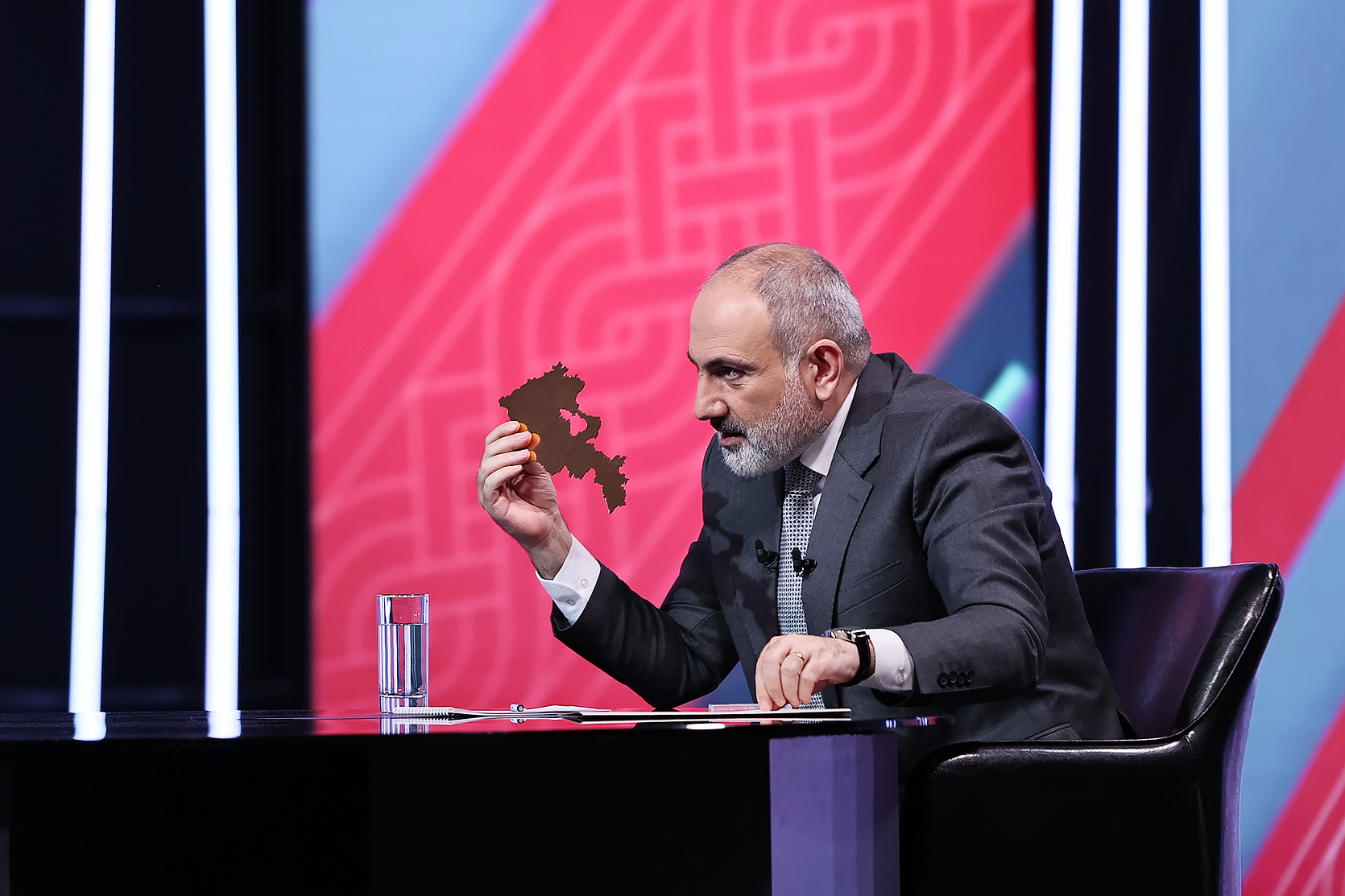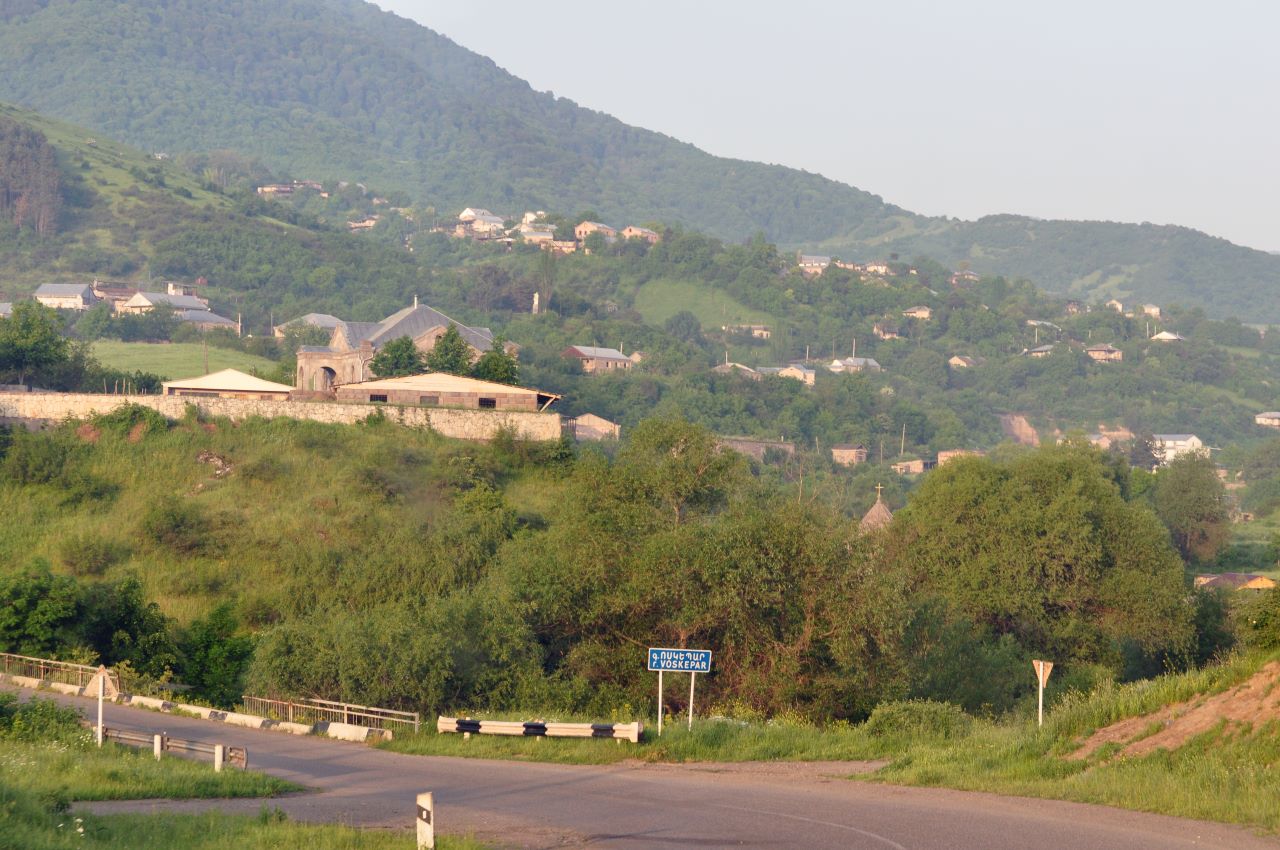Opinion: "Behind movement against border demarcation – Russia and 5th column in Armenia"
Movement against demarcation in Armenia
The movement “Tavush for the Sake of Homeland” in Armenia demands the halt of the border demarcation process with Azerbaijan, both in Tavush and elsewhere. Under the leadership of Archbishop Bagrat Galstanyan of the Tavush Diocese, hundreds of local residents began a march from the border village of Kirants to Yerevan on May 4. Participants of the action declared that they are heading to the capital to “demand answers.”
Representatives of the ruling party emphasize that the movement participants do not make any political demands. As parliament speaker Alen Simonyan stated, it is unclear what process is even being discussed.
“Are we a theocracy, a religious state? What are we doing? And if it’s not a clergyman speaking out, but a citizen, then he should come up with a proposal. When someone says they are against demarcation, they should present their proposal as a counterbalance,” he told journalists.
Political analyst Gurgen Simonyan sees the protest movement as problematic. Not because it is led by a clergyman, but because Russia and the local “5th column” stand behind it, using “appropriate technologies and can exploit any situation for their own purposes.”
On April 19, Yerevan and Baku announced that the commissions of the two countries on demarcation had agreed to bring the border in the Tavush-Gazakh section in line with the “interrepublican border existing at the time of the collapse of the USSR.” Armenia agreed to transfer territories of four bordering “non-enclave villages” to Azerbaijan. And in the Tavush region, 40 border posts have already been installed.
At the same time as the demarcation/delineation process in Armenia, protest actions are taking place. Residents of the Tavush region believe that the authorities are making unilateral concessions that create problems for their security. Prime minister Nikol Pashinyan recently stated that an undemarcated border is a cause for conflict with Azerbaijan. “That’s why we’re starting demarcation from areas with the highest conflict potential,” he said on Public Television.
- Is Armenia making unilateral concessions? Yerevan and Baku agree on border delimitation
- Territory in exchange for peace: Will Azerbaijan refrain from a new war?
- Bashkend – an enclave abandoned for 32 years
“This is not a fight between good and bad”
The “Tavush for the Sake of Homeland” movement began its march on Saturday, May 4. Participants of the protest action are already in the Gegharkunik region and intend to reach Yerevan by May 9. Here, as they say, the protest actions will continue until the demarcation and delineation process is stopped.
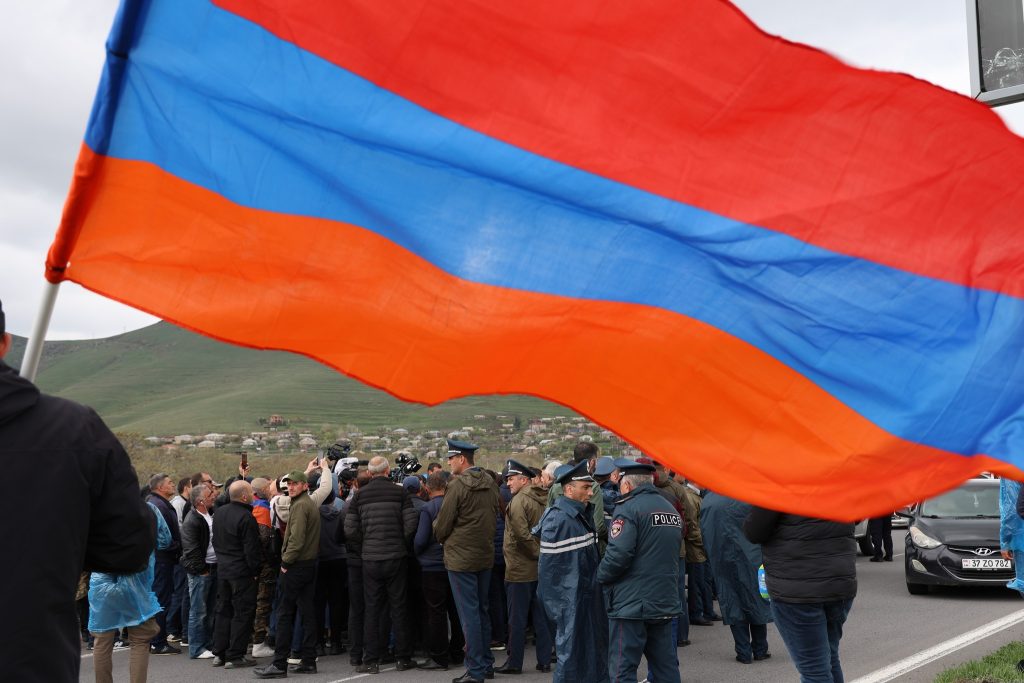
How they will achieve this is unclear as they do not discuss it. Meanwhile, parallel to their action in the Tavush region, the process of demining and demarcating the border continues.
“This march will restore our honor and homeland,” Archbishop Bagrat Galstanyan declared the day before.
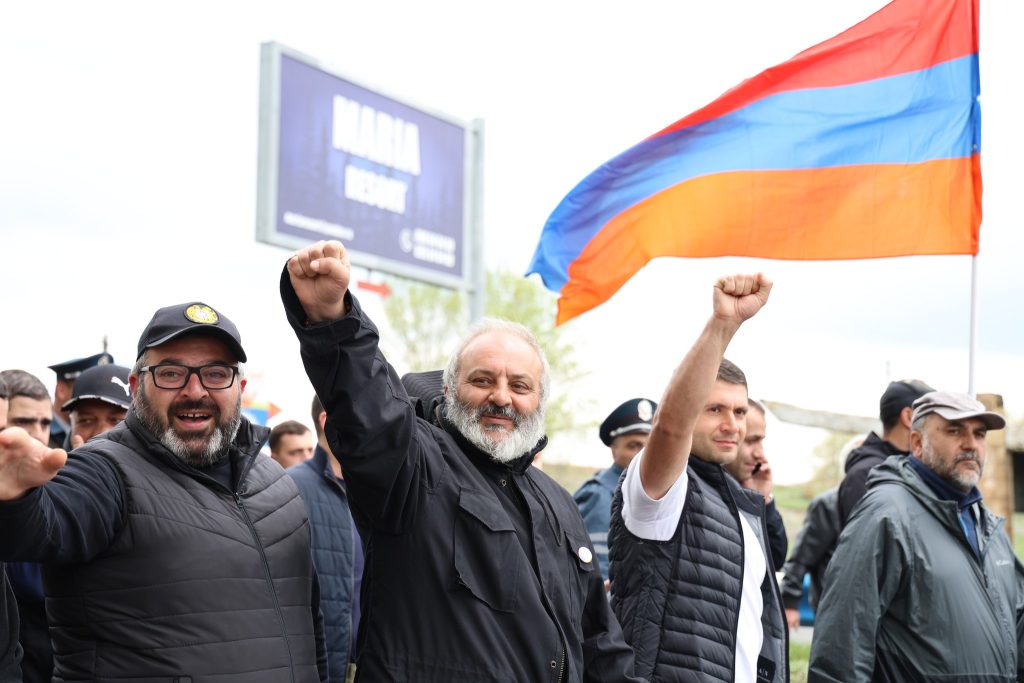
The procession involves artists, relatives of the victims of the 44-day war in Karabakh, and representatives of opposition political parties.
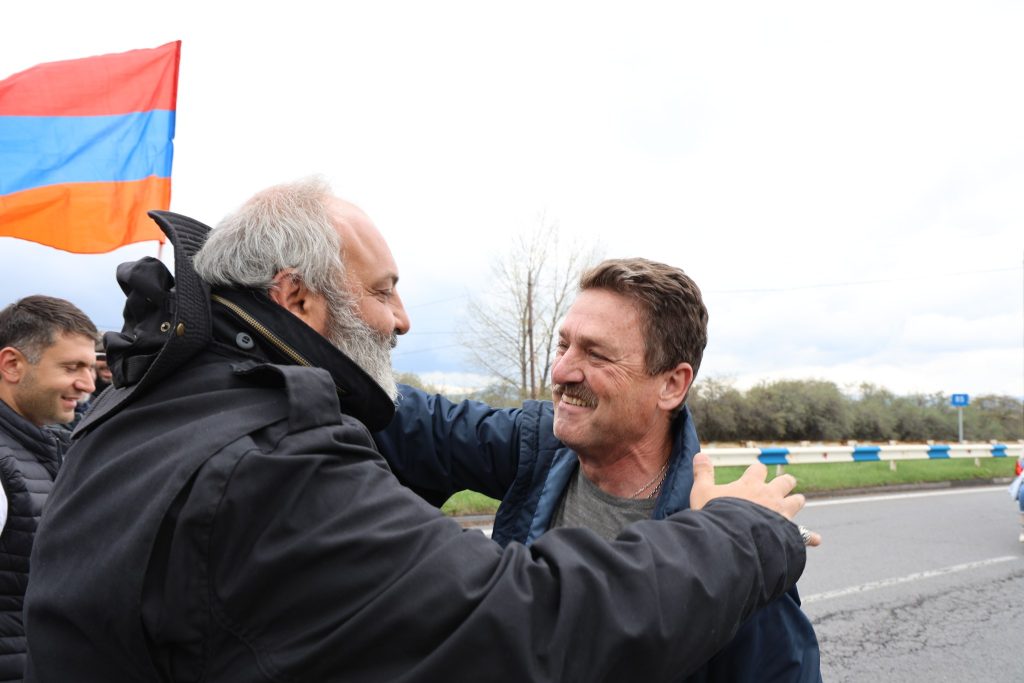
According to Archbishop Galstanyan, this is not a fight between “good and bad.” The movement’s goal is to “stop the unacceptable process of border demarcation.”
When asked if the Holy See of Etchmiadzin, meaning the Catholicos, would join the movement, he replied, “The Holy See is always with us. The Armenian Patriarch himself is our father, the one who blesses us and guides us.”
Relations between the Armenian Apostolic Church and the country’s authorities have become strained after the 2020 war in Karabakh when the Catholicos of All Armenians called for the resignation of Armenian prime minister Nikol Pashinyan.
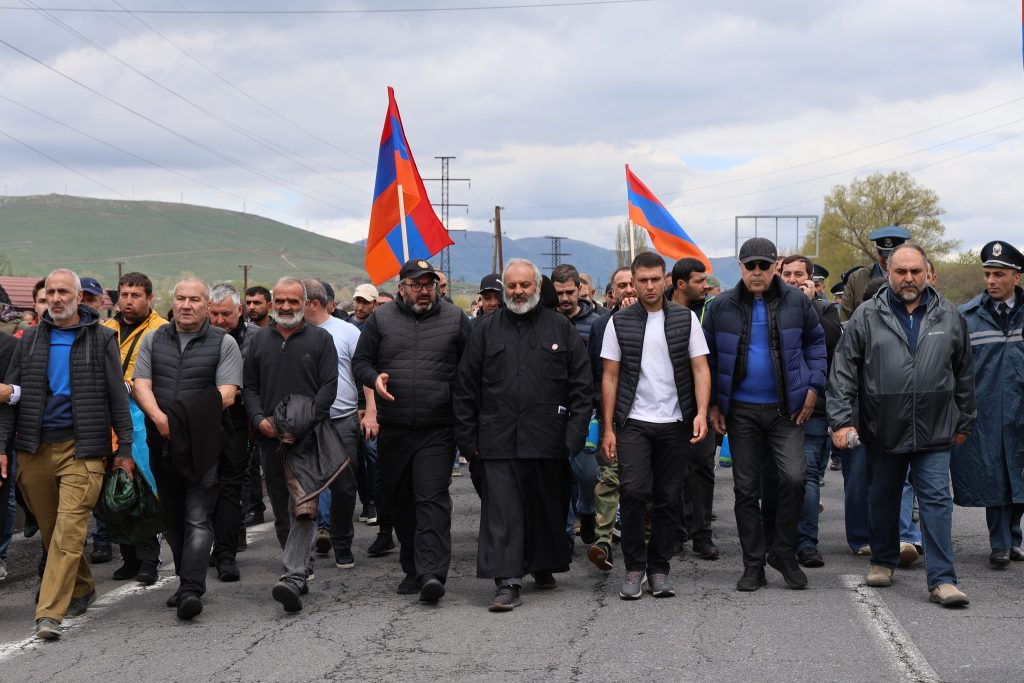
All the photos are from the movement’s Facebook page
“There is no risk of a change in power”
“I respect all of our citizens who hold different opinions, with which I may not agree. However, I have not heard any political demands,” stated the speaker of the Armenian Parliament in a conversation with journalists on Monday morning.
In response to the movement’s demand to “stop unilateral concessions,” Alen Simonyan stated that Armenia is not making concessions but rather fixing its border based on legally binding maps.
The speaker also mentioned that he does not see any danger of a change in power in Armenia:
“A change in power in the Republic of Armenia is only possible through the results of parliamentary elections scheduled for 2026.”
According to him, the Armenian people trust the delineation and demarcation process and do not view “certain church representatives as politicians”:
“And the people understand that the church, God, the emotions we experience as Christians, and the individuals who serve political interests today are different things. I do not believe that the people of Armenia have lost their wisdom.”
Additionally, Simonyan speculated that the movement is associated with former Armenian president Robert Kocharyan. Simonyan sees an “external trace” in this process, pointing to Russia’s interests in the region and the pro-Russian sentiments of Armenia’s opposition.
About the head of the Tavush diocese
Archbishop Bagrat Galstyan has been leading the Tavush Diocese since 2015. He is actively engaged in social activities and has established several socio-educational centers and leadership schools in the region. He is highly respected and trusted by the residents of the area.
In the past two weeks, the archbishop has been actively involved in protests in Tavush villages where border demarcation is taking place.
During this time, some media outlets published information claiming that he was allegedly involved in entrepreneurship, which was later refuted. Subsequently, the clergyman was falsely accused of “having two sons whom he exempted from military service.” This information was shared on their social media pages by some members of the ruling parliamentary faction. However, they later apologized, explaining that the source of their posts was publications in the press that did not reflect reality.
Commentary
The movement is supported by former Armenian presidents Serzh Sargsyan and Robert Kocharyan, who are not widely respected in society, notes political analyst Gurgen Simonyan. In light of this, he believes that the protest movement will not gain significant momentum.
“Regardless of the issue the movement participants want to address, the list of involved actors alone is enough for the movement not to acquire a nationwide character,” emphasized the political analyst.
He does not see a danger of establishing a theocracy in Armenia. However, he considers the involvement of Russia and the “5th column” problematic. Here lies, in his words, an “external influence”:
“The Russian Federation wants to pursue an explosive and destabilizing policy in Armenia to bring to power forces that are more suitable and loyal to it. With their help, Russia intends to advance the military and political programs it needs in Armenia and in the region.”
In the opinion of the political analyst, the head of the Tavush Diocese is an honest, patriotic individual who has been “drawn into political processes”:
“The forces involved in the movement may simply be using his influence, based on their group or personal interests.”
Gurgen Simonyan is confident that former presidents cannot rehabilitate themselves in the eyes of society as political figures, so they are trying to pass on the “banner of their aspirations to the church.”
According to the analyst, the “catastrophic situation observed in Armenia’s domestic political space” is a consequence of the fact that after the “Velvet Revolution” of 2018, no lustration took place.
The results of surveys show that only 7-14% of the population currently support the incumbent government of Armenia, and the “former retrograde forces do not even reach two percent,” says the expert.
Those politicians rejected by society in 2018, he says, have no chance of returning to power, no matter how dissatisfied people are with the current government. Simonyan sees the need for the formation of a new political force that can win the sympathy of the people and become an alternative.










